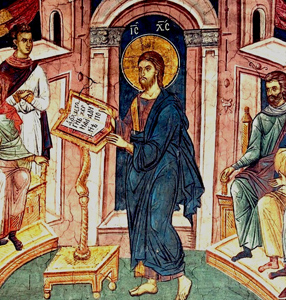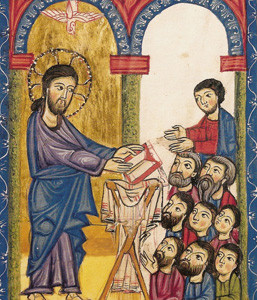For Sunday February 3, 2019
Lectionary Readings (Revised Common Lectionary, Year C)
Jeremiah 1:4-10
Psalm 71:1-6
1 Corinthians 13:1-13
Luke 4:21-30
You Can’t Go Home Again. It’s the title of a 20th century American novel by Thomas Wolfe. It’s also an apt title for this week’s Gospel story, a story in which Jesus returns to Nazareth, preaches in his childhood synagogue, infuriates his old friends and relations, and almost dies when they try to shove him over a cliff. Apparently, it's true: you can’t go home again. Sometimes, the hometown boy won’t make good.
The story Luke tells is a strange one, full of emotional twists and turns. Within the space of ten verses, everything goes south. Curiosity turns into contempt. Delight gives way to hatred. Worship morphs into violence. Why?
I’ve spent the past week replaying the details in my head, trying to figure out exactly what went wrong. After all, when we left Jesus last week, things were looking pretty good. He was center-stage amidst an admiring congregation, reading a beautiful passage from the prophet Isaiah about good news for the poor, freedom for the prisoner, sight for the blind, and justice for the oppressed. Every eye in the synagogue was fixed on him, impressed by his gracious words and authoritive bearing. Wasn’t this Joseph’s boy? The carpenter’s kid with the iffy birth story? Who would have thought he’d grow up to become a healer! A preacher! A miracle worker! Their very own rising star.
It’s not difficult to imagine our way into the townspeople’s point of view. Who knows how long they’d been waiting to welcome Jesus home? To see for themselves the wonders they’d heard about via the grapevine? That the heavens opened up in Jesus’s presence. That water turned into wine. That diseases disappeared and demons scattered to oblivion. Surely, they must have thought, if their boy was willing to peddle miracles to perfect strangers “out there,” he’d do a hundredfold back here at home. Among his kin. His insiders. His favorites.
 |
But they were dead wrong. As far as I can tell, the story turns precisely when Jesus refuses to go home in the ways that matter most to his kin. He refuses to be at home. To stay at home. To allow his home to define him. Everything goes wrong when Jesus essentially says, “I am not yours. I don’t belong to you. I am not yours to claim or contain.”
He does this by citing God’s long history of prioritizing the outsider, the foreigner, the stranger. Elijah was sent to care for the widow at Zarephath, he reminds them. He wasn't sent to the widows of Israel. Elisha was instructed to heal Naaman the Syrian, not the numerous lepers in Israel. In other words, God has always been in the business of working on the margins. Of crossing borders. Of doing new and exciting things in remote and unlikely places. Far from home. Far from the familiar and the comfortable. Far from the centers of power and piety.
As I meditated on the Gospel reading this week, I had to remind myself to linger (uncomfortably) at this point of provocation. If Luke’s account is accurate, then Jesus is the one who pushes his own away in this story. He is the one who rejects their version of welcome, who refuses to abide by the tribalist claims of their hospitality. He is the one who overturns their notions of home and of God’s place in it. “You can’t go home,” he basically tells them. “You can’t hunker down and stay where you are, expecting God to hang out with you. God is on the move. God is doing a new thing. God is speaking in places you don’t recognize as sacred, privileging voices you’re not interested in hearing, and saying things that will make your ears burn. Can you handle it? God is not yours. You are his.”
 |
What does this mean for us? Maybe it means that if the Jesus we worship never offends us, then it’s not really Jesus we worship. Yes, ouch. Remember, the Jesus Luke describes pushed so hard against his listeners’ cherished assumptions about faith, they nearly killed him. When was the last time Jesus made you that angry? When was the last time he touched whatever it is you call holy — your conservatism, your progressivism, your theology, your denomination, your Biblical literacy, your prayer life, your politics, your wokeness — and asked you to look beyond it to find him?
I ask because the disconcerting truth about this week’s lection is that we — we the Church — are the modern day equivalent of Jesus’s ancient townspeople. We’re the ones who think we know Jesus best. We’re the ones most in danger of domesticating him. We’re the ones most likely to miss him when he shows up in faces we don’t recognize or revere. What will it take to follow him into new and uncomfortable territory? To see him where we least desire to look? To leave home?
Barbara Brown Taylor writes that disillusionment, even though it stings, is essential to the Christian life: "Disillusionment is, literally, the loss of an illusion — about ourselves, about the world, about God — and while it is almost always a painful thing, it is never a bad thing, to lose the lies we have mistaken for the truth.”
| |
Luke’s story this week calls us to disillusionment. It calls us to leave home and find Jesus. To choose movement over stasis, change over security. So I wonder: how do I refuse to let others in my life grow and change? When do I box them into identities that are narrow and constricting? Where in my life do I try to "kill" the new and the unfamiliar, instead of leaning into newness with curiosity and delight? Do I allow the people I am close to to become? Do I allow myself to become? Or do I cut myself and others off with expectations none of us can bear: "You will always be… small, weak, broken, insufficient, disappointing. You will never outgrow… your background, race, family, upbringing, wounds, addictions. You must always be… recognizable, accommodating, domesticated, mine.”
You can’t go home again. You can’t stay. Why? Because God is on the move. God is busy at the margins. God is doing new things. And God invites us to join him on the journey. Are you ready? Are you afraid? Are you willing to try, anyway? Okay. That's good enough. Let’s go.
Image credits: (1) Right-or-ron.com; (2) Noe Valley Ministry; and (3) Cacina.





